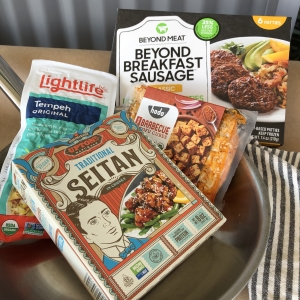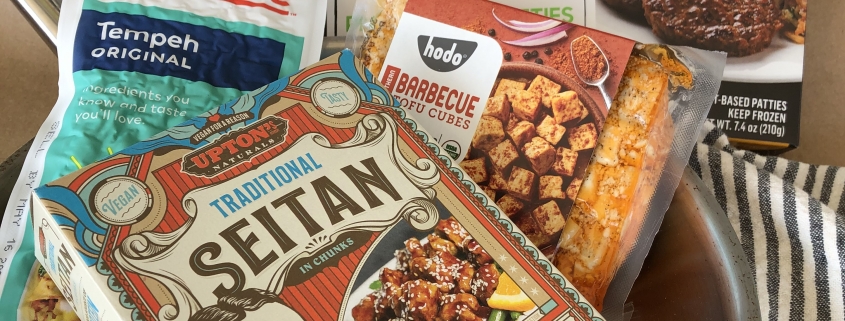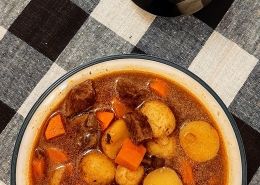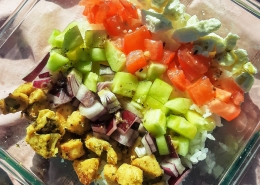New to You? Plant-Based Proteins
Have you stopped by the Co-op this month? Thanks to our expansion progress, we were able to bring in lots of new products. We’ve added a refrigerated section dedicated to meat and cheese alternatives, full of familiar products and new additions for you to try.
With so many new things, figuring out which products will work for you can seem tough. We’re here to offer you a quick guide to plant-based proteins that will help you determine your best options, and the tastiest.
PLANT PROTEINS
The building blocks of plant-based proteins sources are beans, nuts, and seeds. Some of the most popular vegan and vegetarian proteins are tofu and tempeh, which are made from soybeans. Tofu is made from soy milk curds, which are pressed into blocks of different firmness. Its flavor is very mild, which means it can absorb any spices and flavorings you’d like to use in a dish. You can even use silken and soft tofu in desserts or smoothies to add a creamy texture. Tempeh is made by pressing soybeans into a cake and fermenting them, which binds them together and gives them a firm texture. It has a nutty flavor and has lots of fiber and vitamins because it’s made using whole soybeans and is a fermented food. Another staple plant protein, seitan, is different from soy-based foods. Seitan is made from vital wheat gluten, a flour high in protein. Water is added to the flour, after which it is kneaded like bread dough and cooked, usually with spices and flavorings. Seitan can be chewy or firm in texture depending on how it’s prepared and it serves as a great meat substitute in all kinds of recipes. We offer tofu, tempeh, and seitan in our new plant-based refrigerator case. These products are minimally processed, are great sources of protein, and serve as a blank canvas for all kinds of flavors you’d like to create. You’ll find several products that have spices and seasonings to save you time when making your meals.
MEAT ALTERNATIVES
 Many people are aiming to scale down their meat consumption or follow a plant-based diet, but don’t want to miss out on their favorite foods. Meat alternatives are a great way to achieve the flavor and texture you crave without consuming animal products. Plant-based sausages, deli meat slices are just some of the products we offer alongside alternatives to bacon, chicken, and ground beef. These products all use tofu, seitan, or tempeh to form the base of their products. While these products have more ingredients, this is because they’re flavored using different spices, sauces, or seasonings to imitate the flavor of specific meats. Meat alternatives may also undergo more processing than plain tofu, tempeh, or seitan to create the right texture and imitate a specific meat. Some meat alternatives add other whole-food ingredients in addition to spices to add flavor and texture using onions, carrots, tomatoes, mushrooms and even apples.
Many people are aiming to scale down their meat consumption or follow a plant-based diet, but don’t want to miss out on their favorite foods. Meat alternatives are a great way to achieve the flavor and texture you crave without consuming animal products. Plant-based sausages, deli meat slices are just some of the products we offer alongside alternatives to bacon, chicken, and ground beef. These products all use tofu, seitan, or tempeh to form the base of their products. While these products have more ingredients, this is because they’re flavored using different spices, sauces, or seasonings to imitate the flavor of specific meats. Meat alternatives may also undergo more processing than plain tofu, tempeh, or seitan to create the right texture and imitate a specific meat. Some meat alternatives add other whole-food ingredients in addition to spices to add flavor and texture using onions, carrots, tomatoes, mushrooms and even apples.
Almost every food, no matter how unprocessed or processed, will contain ingredients that make sure it’s fresh and safe for you to eat. In the early days of meat alternatives many products were made using soy protein isolate, a plant protein that is more highly processed, in addition to more stabilizers for texture or flavor. This caused concern among those who preferred their foods unprocessed and with fewer ingredients. Thanks to years of research and development in the meat alternative industry and consumer demand for products that are more minimally processed, today’s products use more whole ingredients and less processing.
WHAT SHOULD I TRY?
For those looking to directly replace the flavor or texture of meat in their favorite dish, meat alternatives may be exactly what you’re looking for. They’re also a great way to add a vegan or vegetarian version of an ingredient that may be difficult or time consuming to make on your own. For those looking to start a more plant-based diet, these products can serve as a bridge to start you off. If you prefer to control the flavors and seasonings of your proteins, you may want to stick to products like plain tofu, tempeh, or seitan. Those who dislike the texture of meat may also enjoy these products more than meat alternatives. If you’re concerned about the level of processing in your food, we also offer different types of protein-rich plant foods outside of our refrigerated case. You can make your own seitan using vital wheat gluten, snack on nuts and seeds or use beans and lentils in your favorite dishes.
Any food can fit into a balanced diet. Just like other foods, picking the right plant-based protein for you depends on your dietary needs and what you want from your product. The Co-op carries a variety of plant-based foods and meat alternatives in the new refrigerated section and the freezer section – they are also available for curbside pickup using Co-Go. Your newest favorite find could be right around the corner!

















